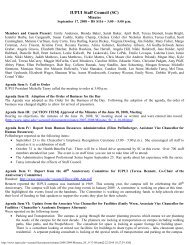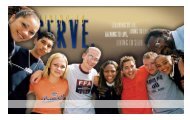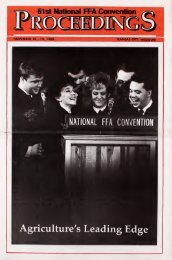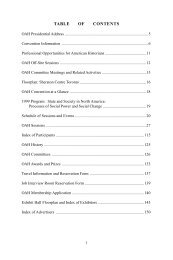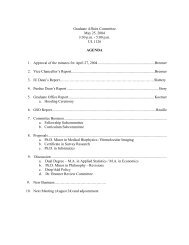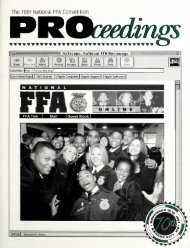What is Social Change Funding? Dana A. Alston: Activist and Funder
What is Social Change Funding? Dana A. Alston: Activist and Funder
What is Social Change Funding? Dana A. Alston: Activist and Funder
Create successful ePaper yourself
Turn your PDF publications into a flip-book with our unique Google optimized e-Paper software.
Conference information can be found at www.nng.org<br />
Leading By Example<br />
As we encourage NNG members<br />
to increase 1% More for<br />
Democracy, we would like to recognize<br />
those making a significant<br />
contribution to help<br />
empower <strong>and</strong> support communities<br />
<strong>and</strong> organizations whose<br />
voices have been traditionally<br />
unheard in the democratic<br />
process. In the philanthropic<br />
community we have remarkable<br />
institutions that can - <strong>and</strong> do <br />
payout to the maximun capacity<br />
of their organization.<br />
Stewart R. Mott<br />
Charitable Trust<br />
(New York, NY)<br />
Continued from page 3 • Rob McKay, Our Approach<br />
A sense of real<strong>is</strong>m needs to<br />
accompany our conception of the<br />
donor/grantee relationship. I<br />
believe that it takes a minimum<br />
of three years to build an honest<br />
dialogue with the leadership of<br />
an organization. Our foundation<br />
has had to get comfortable with<br />
the idea that initial funding <strong>is</strong><br />
often made on faith <strong>and</strong> intuition.<br />
It <strong>is</strong> only through the<br />
process of investing in people<br />
that we can begin to learn what<br />
<strong>is</strong> possible. Not surpr<strong>is</strong>ingly, the<br />
"site v<strong>is</strong>it" <strong>is</strong> not usually the<br />
best forum for building trust <strong>and</strong><br />
mutual respect. Conversely, it<br />
<strong>is</strong> also clear to me that there are<br />
limits on what we can expect<br />
from these relationships. I have<br />
come to characterize our role<br />
with the activ<strong>is</strong>t community as<br />
that of an "ally". I believe th<strong>is</strong><br />
conception of the work reflects<br />
the sense that we are in a struggle<br />
together which dem<strong>and</strong>s<br />
unique roles <strong>and</strong> responsibilities<br />
for the various players. Our job<br />
<strong>is</strong> to provide resources to the<br />
men <strong>and</strong> women doing the hard<br />
work of organizing every day.<br />
Beyond that, we attempt to offer<br />
an array of tangible supports<br />
(access to consultants, legal<br />
advice, media expert<strong>is</strong>e) that can<br />
leverage the efforts of these<br />
groups <strong>and</strong> enhance their chance<br />
of success.<br />
With an asset level of $13 million,<br />
the Stewart R. Mott<br />
Charitable Trust <strong>is</strong> currently paying<br />
out 8%. Program Associate<br />
<strong>and</strong> NNG member Steve Cheifetz<br />
explains, "It was a very conscious<br />
dec<strong>is</strong>ion by us to no<br />
longer be guided by the "must<br />
give" <strong>and</strong> to increase our payout<br />
to reflect the growth of our<br />
endowment along with the<br />
growing needs of our grantees<br />
<strong>and</strong> the movement."<br />
My criteria for our grantmaking<br />
<strong>is</strong> relatively straightforward. In<br />
a word, it's about power. <strong>Social</strong><br />
change funding <strong>is</strong> supporting<br />
leaders <strong>and</strong> communities who<br />
have not had access to power<br />
<strong>and</strong> who have a plan for reshaping<br />
the economic <strong>and</strong> political<br />
l<strong>and</strong>scape in their communities.<br />
The field of philanthropy likes to<br />
create <strong>is</strong>sue labels that help us<br />
identify the parameters of our<br />
giving. To my way of thinking,<br />
<strong>is</strong>sues are points of engagement.<br />
It really doesn't matter if a community<br />
organization affects<br />
change by challenging corporate<br />
behavior that results in polluted<br />
air <strong>and</strong> water or by advocating<br />
for economic development in<br />
poor neighborhoods. <strong>What</strong> <strong>is</strong><br />
important <strong>is</strong> articulating a v<strong>is</strong>ion,<br />
executing a plan of action, <strong>and</strong><br />
affecting positive change in the<br />
lives of the constituent base.<br />
Those efforts that strike me as<br />
the most effective are the ones<br />
that have a primary objective of<br />
confronting mainstream institutions.<br />
These groups reward<br />
those individuals who take leadership<br />
<strong>and</strong> foster a sense of<br />
accountability from all those who<br />
work with them. Most importantly,<br />
they refuse to have their<br />
concerns marginalized by their<br />
own behavior, or by the actions<br />
of others.<br />
Wendling Foundation<br />
(Washington, DC)<br />
The Wendling Foundation<br />
passed a Board resolution in<br />
April of 1999 to begin paying out<br />
6% of assets each year for<br />
grants. Th<strong>is</strong> 6% will be used for<br />
grants only, <strong>and</strong> will not<br />
include admin<strong>is</strong>trative or investment<br />
expenses. Th<strong>is</strong> family foundation's<br />
current assets are at $11<br />
million, <strong>and</strong> have grown considerably<br />
over the past few years.<br />
Heleny Cook, the foundation's<br />
President, comments on the<br />
Board's dec<strong>is</strong>ion, "Our purpose<br />
<strong>is</strong> not to build up our assets, but<br />
to use the foundation to build<br />
community development...I think<br />
they took a bold step." •<br />
The membership of NNG has the<br />
opportunity to lead the field of<br />
philanthropy by example. Many<br />
of us are working with community<br />
activ<strong>is</strong>ts in ways that transcend<br />
traditional notions of<br />
"donor/grantee" relationships.<br />
We do underst<strong>and</strong> patient funding<br />
<strong>and</strong> the need to provide core<br />
operating support. However, th<strong>is</strong><br />
message <strong>is</strong> not reaching far<br />
enough into the field. My challenge<br />
to all of us <strong>is</strong> to become<br />
public advocates for social<br />
change grantmaking. As funders<br />
we support program areas that<br />
include organizing, advocacy,<br />
<strong>and</strong> the efforts of communities<br />
who organize on their own<br />
behalf to solve their problems<br />
<strong>and</strong> create a more just society.<br />
believe as philanthrop<strong>is</strong>ts, we<br />
too need to engage in th<strong>is</strong> type<br />
of work within the funding community.<br />
We need to organize on<br />
behalf of the grantees we serve.<br />
We need to lead the institutions<br />
we direct, <strong>and</strong> advocate for<br />
social change funding from the<br />
more mainstream foundations<br />
we work in. We need to see ourselves<br />
as the social change<br />
agents we often expect our<br />
grantees to be. Th<strong>is</strong> <strong>is</strong> critical if<br />
we are to build meaningful<br />
alliances with community<br />
activ<strong>is</strong>ts <strong>and</strong> each other. •<br />
5




